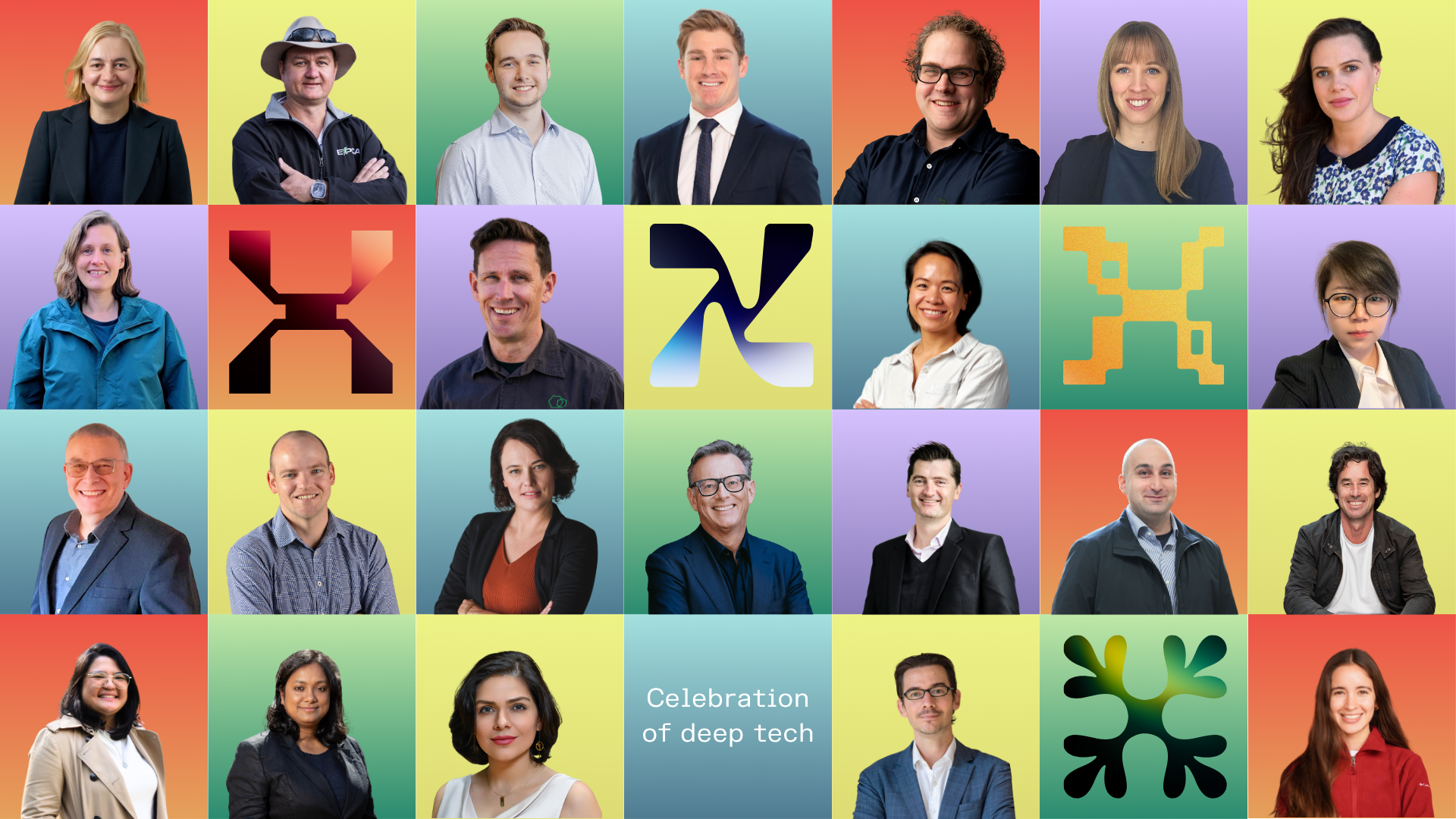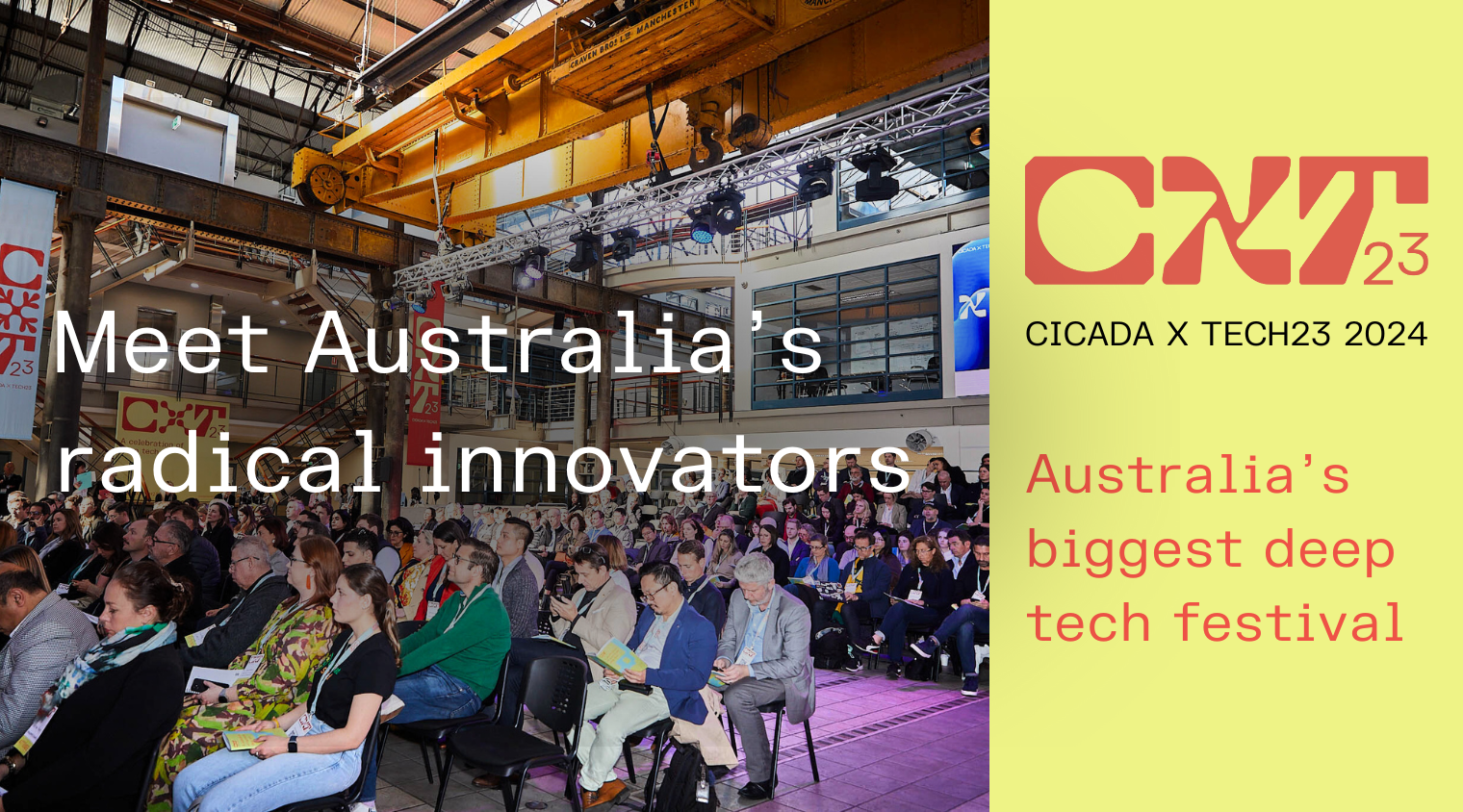From artificial kidneys to GPS-free navigation, meet the 23 deep tech ventures taking to the stage at Cicada x Tech23 2025

Deep tech takes time, grit, and bold belief. But if we want to solve the big challenges from climate to health to energy, we need it.
Founders who’ve experienced these challenges firsthand, built the expertise to tackle them, and are emerging as Australia’s next generation of leaders.
Cicada x Tech23 returns to Sydney on 10 September 2025, spotlighting 23 of the most visionary deep tech ventures from across the country and the bold, ambitious people building them.
Selected from a record 150 applications across ACT, WA, NSW, VIC and QLD, this year’s cohort marks the most nationally diverse and competitive lineup in the event’s history.
Each chosen not just for their breakthrough sciences that are solving global-scale challenges, but for their leadership, originality, and ambition, driven by their mission of personal conviction and lived experiences.
These are not your typical startups. These are the bold leaders pioneering Australia’s future innovation landscape. They are scientists, engineers, and entrepreneurs developing world-first technologies, from artificial kidneys and GPS-free navigation, to climate-resilient materials and real-time health diagnostics.
Behind every venture is a story of purpose. A founder, driven by the loss of her father on the transplant waitlist, is developing a fully implantable artificial kidney. A mother of a premature baby has created real-time neonatal monitoring to prevent harm. An Indigenous engineer is electrifying mining fleets to help decarbonise Australia’s heaviest emitters. An aerospace team is rethinking flight to enable heavy vertical lift in remote and crisis-stricken areas.
The 23 ventures have been grouped under five overarching categories aimed at asking big questions about how deep tech can rewire the systems we rely on, from materials and infrastructure to health and mobility.
With time running out! Join us at Doltone House, Jones Bay Wharf on the 10th of September, get your ticket here.
We’re proud to introduce the Cicada x Tech23 cohort of 2025.
Re-Sourcing the World
Transforming carbon, waste, and critical minerals into the raw materials that will power a climate-conscious, resource-constrained future. Startups in this session are redefining where value comes from, from transforming carbon, waste, and critical minerals into the raw materials that will power a climate-conscious, resource-constrained future.

Banksia Minerals Processing - Redefining the future of copper production
They are building a new normal for copper production, replacing traditional smelting with a cleaner, safer, and more cost-effective process. Their low-emission technology eliminates toxic byproducts and operates without furnaces, unlocking resources once considered too hard or dirty to mine. Spun out of the University of Queensland and backed by industry, Banksia offers a scalable path to refining copper that meets modern expectations.
COOL ENGINEERING - Transforming carbon dioxide from liability to asset, fuelling net-zero aviation.
COOL ENGINEERING has built a compact, modular “COOL plant” that captures carbon dioxide from the air and industrial sources, and converts it into drop-in hydrocarbon fuels. The process requires no fossil inputs or high pressure, and mimics the carbon-capturing power of trees in minutes. Patented in the US, Europe, India, and Australia, the system is designed to integrate with sectors like steel, cement, and transport. With pilot deployments underway, it offers a scalable path to closing the sustainable aviation fuel gap.
Facet Amtech - A clean alternative to one of the world’s dirtiest processes.
Ammonia is essential for food and fuel, but current production relies on fossil fuels and extreme conditions. Facet Amtech has developed a catalyst that enables ammonia synthesis at room temperature without high heat or pressure. Their process bypasses the 100-year-old Haber-Bosch method, slashing emissions and costs. Spun out of the University of Newcastle, this Australian innovation opens the door for clean ammonia as a fuel and fertiliser in a decentralised, low-carbon economy.
Built with Biology
These ventures are using biology as infrastructure, harnessing living systems to grow, fabricate, and regenerate everything from industrial materials to ecosystem intelligence.

Algenie - Making algae the foundation of tomorrow’s industrial economy
Their patented helical photobioreactor grows cyanobacteria using light and wasted renewable energy, with no farmland or added CO₂. The system absorbs two kilograms of carbon for every kilogram of product, and is up to 50 times cheaper than existing photobioreactors. By unlocking low-cost, large-scale algae production, Algenie enables sustainable alternatives for fuels, plastics, proteins, and lays the foundation for a new, climate-positive industrial economy.
BioCarbon - Turning waste wood into clean industrial fuel.
Coal is still widely used in heavy industry, but BioCarbon is replacing it with a renewable alternative made from forestry waste. Their patented process turns wet, unprocessed wood into GreenChar, a high-grade carbon product that powers electric furnaces for steelmaking. It requires no external energy and has completed industry trials, with a commercial plant underway. BioCarbon proves that fossil fuels aren’t just replaceable, they’re outperformed by waste.
Humble Bee Bio - Reawakening elastin, nature’s forgotten molecule.
After puberty, the body stops producing elastin, leading to signs of ageing and reduced tissue flexibility. Humble Bee Bio has created a bioinspired peptide that restarts elastin production, delivering visible results in 12 hours and 500% better performance than existing ingredients. Clean, sustainable, and clinically validated, it’s set to disrupt the aesthetics market. A portion of profits supports Indigenous-led biodiversity initiatives, blending scientific innovation with purpose-driven impact.
Membrane Transporter Engineers (MTE) - Reclaiming value from industrial wastewater.
Membrane Transporter Engineers (MTE) is developing nature-inspired membrane technologies that recover high-value materials like lithium, cobalt, and phosphorus from complex industrial wastewater. By mimicking how plant cells selectively transport nutrients, their tech supports a circular economy, turning waste into resources for agriculture, mining, and clean energy.
Sprout Materials - Packaging foam that can actually be recycled.
Polyurethane foam is everywhere, from packaging to furniture and is rarely recycled. Sprout Materials has developed a chemically recyclable alternative that performs like conventional foam and works with existing manufacturing systems. Built on patented ANU chemistry, Sprout Materials’ circular materials let producers meet sustainability targets without compromise. It’s a practical climate solution ready for scale.
Engineering New Capability
This is deep tech that enables the impossible: sensing, navigating, and operating in environments beyond the reach of legacy systems, from autonomous flight to quantum-scale perception.

Burl Aerospace - Heavy lift, anywhere, with next-gen vertical flight.
Transporting heavy or oversized cargo usually requires runways or helipads. Burl Aerospace is building an aircraft that doesn’t. Their mono-wing rotor system separates lift and thrust, enabling extreme payloads to be deployed from rooftops, remote terrain, or disaster zones. Backed by aerospace veterans and working with defence and emergency services, Burl is reimagining where and how aerial logistics can go. Built in Australia, designed for global movement.
CatQ - Fixing the Achilles heel of quantum computing.
Quantum computers are powerful but extremely error-prone. CatQ has developed a way to correct optical quantum errors before they happen, improving performance up to 1,000x. Their technology delivers near-perfect efficiency, solving a key barrier to real-world quantum applications. Spun out of ANU and led by global optics expert Dr Sophie Jie Zhao, CatQ is grounded in Nobel Prize-winning science and positioned to advance quantum computing worldwide.
DeteQt - Quantum sensing for when GPS fails.
GPS is essential, but often unreliable in underground, remote, or contested environments. DeteQt has developed a compact quantum magnetometer that uses diamond electron spin to detect magnetic anomalies, enabling precise, drift-free navigation without satellites. Their sensor integrates directly with a custom silicon chip, a global first, and is already backed by a $3.4 million Australian Defence contract. From Sydney labs to national security, DeteQt is redefining positioning.
Powered by NOA - Wireless charging for autonomous systems, no plugs required.
Powered by NOA is revolutionising wireless charging, enabling uninterrupted operations and improving uptime. Powered by NOA fixes that with rugged, wireless charging systems for drones, robots, and mobile machinery. No plugs, no downtime, no human intervention. Their tech enables seamless, self-directed charging in real-world conditions. Backed by Sydney Angels and Startmate, Powered by NOA is already piloting with enterprise customers across Australia and beyond.
X-Centric Sciences - Lab-grade soil testing, instantly and on-site.
Soil testing is slow, costly, and fragmented. X-Centric Sciences has developed a handheld device that delivers lab-grade analysis on-site in minutes, including carbon and full chemical profiles. It replaces weeks-long delays with instant insights for farmers, agronomists, and sustainability teams. Now piloting with PepsiCo, X-Centric Sciences is showing how better soil data supports sustainable agriculture across global supply chains.
A New System of Care
This session reveals how healthcare is shifting from reactive to preemptive, with sensing, diagnostics, and monitoring systems that act before symptoms appear, building a future where health is continuous, ambient, and engineered.
![[Cicada x Tech23 2025] Meet the 23 (1)](https://info.cicadainnovations.com/hs-fs/hubfs/Tech23/%5BCicada%20x%20Tech23%202025%5D%20Meet%20the%2023%20(1).png?width=360&height=360&name=%5BCicada%20x%20Tech23%202025%5D%20Meet%20the%2023%20(1).png)
Liora Neurotech - Predicting psychiatric relapse before it happens.
Psychiatric relapse can escalate fast, often without early warning. Liora Neurotech is developing Lumara, a wearable biosensor that tracks biomarkers like cortisol, inflammation, and melatonin to detect relapse risk in schizophrenia and bipolar disorder. Founder Naomi Dragt brings both research expertise and personal caregiving experience. With continuous sensing, Lumara helps patients and clinicians take proactive steps earlier, shifting mental healthcare from reactive to preventative.
Nutromics - Saving lives through continuous diagnostic monitoring.
Microneedles and DNA-based biosensors now allow biomolecules to be tracked in real time at the bedside. Nutromics’ lab-on-a-patch delivers continuous diagnostic insights, replacing delayed lab data with minute-by-minute visibility. It enables ICU teams to track treatment responses minute by minute. Already tested in humans and backed by $20 million, Nutromics is the first clinically ready system delivering real-time, continuous biomolecular monitoring at the bedside.
OncoRevive - Detecting cancer earlier, from a single drop of blood.
Early cancer detection can save lives, but current tests often miss the first signs. OncoRevive has created a blood test that’s over a billion times more sensitive than standard methods. Analysing DNA, proteins, and sugars in a single sample, their AI-driven platform spots cancer early, with results in hours. It’s a powerful leap toward faster, more accurate, and more accessible diagnosis worldwide.
One Kidney - Reimagining life after kidney failure, no dialysis, no waiting list.
A fully implantable artificial kidney is in development to restore natural function, with no machines, no donor waitlists. One Kidney’s bioinspired membrane system began after engineer Alur Saguinsin witnessed her father’s struggle with kidney failure. She built a high-efficiency external dialyser, now in clinical validation, and is working to bring the next generation of renal care to life.
Pretect Devices - Monitoring intravenous infusion in infants to ensure treatments are delivered safely
In neonatal intensive care, undetected IV leakage can cause life-threatening internal burns. Pretect Devices has developed Vedette, a wearable monitor that continuously checks for early signs of fluid leakage. Inspired by the founder’s experience with her newborn, the device alerts clinicians in real time to prevent harm. It’s a breakthrough in neonatal safety from lived experience to life-saving tech.
The Built World, Upgraded
From self-monitoring infrastructure to energy systems that respond in real time, these startups are embedding intelligence into the physical world, redesigning how we live, move, and power a planet under pressure.

Traditional HVAC systems are inefficient and energy-intensive. ConryTech’s BullAnt platform delivers heating and cooling exactly where and when it’s needed, using up to 70% less energy. Lightweight, fast to install, and designed for smart electrification, BullAnt transforms buildings into grid-responsive assets. The team behind Turbocor, which helped save over a gigaton of CO₂ globally, is once again reshaping building performance with global impact from Australian innovation.
Electric Power Conversions Australia (EPCA) - Electrifying mining fleets without replacing them.
Haul trucks are mining’s biggest emitters, and most still run on diesel. Electric Power Conversions Australia (EPCA) retrofits existing fleets with 100% battery-electric powertrains, retaining up to 80% of original parts while eliminating fossil fuels. Founded by Wunumara engineer Clayton Franklin, their system achieves world-leading battery energy density and better performance than diesel. It’s a circular, cost-effective path to net zero, engineered in Western Australia for a global industry under pressure to change.
Kardinia Energy - Flexible solar, built to move
Kardinia Energy’s printed solar is lightweight, flexible, and recyclable, printed roll-to-roll for rapid, low-cost deployment. Designed to cover vehicles, temporary structures, or rooftops, it delivers clean energy anywhere. Already touring with Coldplay and used in remote communities, Kardinia Energy’s Australian-made tech proves solar can be portable, circular, and scalable worldwide.
PuraLink - How do you fix a broken pipe you can’t reach?
Pipelines are critical but often invisible until something fails. PuraLink has developed autonomous robots that travel inside complex underground pipes to map, inspect, and detect issues without excavation. Designed to navigate sharp bends and variable diameters, their tech supports water, mining, and gas operators. PuraLink offers a smarter solution for infrastructure the world depends on.
Terria - Making complex location data easy to use.
Critical location data is often buried in technical systems, accessible only to specialists. Terria’s open-source platform changes that, letting anyone build interactive maps and digital twins without specialised skills. Used for State digital twins and Digital Earth Africa, it helps governments and businesses visualise data to inform decisions. With new SaaS features and growing adoption, Terria is becoming essential digital infrastructure for a data-driven world.
23 ventures. 1 day. A snapshot of Australia’s deep tech future.
At Tech23 2024, we asked the cohort what drives them, how Cicada x Tech23 has helped, and what it really takes to build the future.
How You Can Get Involved
Cicada x Tech23 is more than just a showcase - it’s a movement. A movement to champion 23 visionary founders, connect them with the right people, and accelerate their journey from lab to market, from startup to scale.
Be part of the future of deep tech in Australia. Be a part of a growing movement supporting 23 ventures that are daring to build what matters.
Join us at Doltone House, Jones Bay Wharf on the 10th of September
Cicada x Tech23 is proudly sponsored by:



